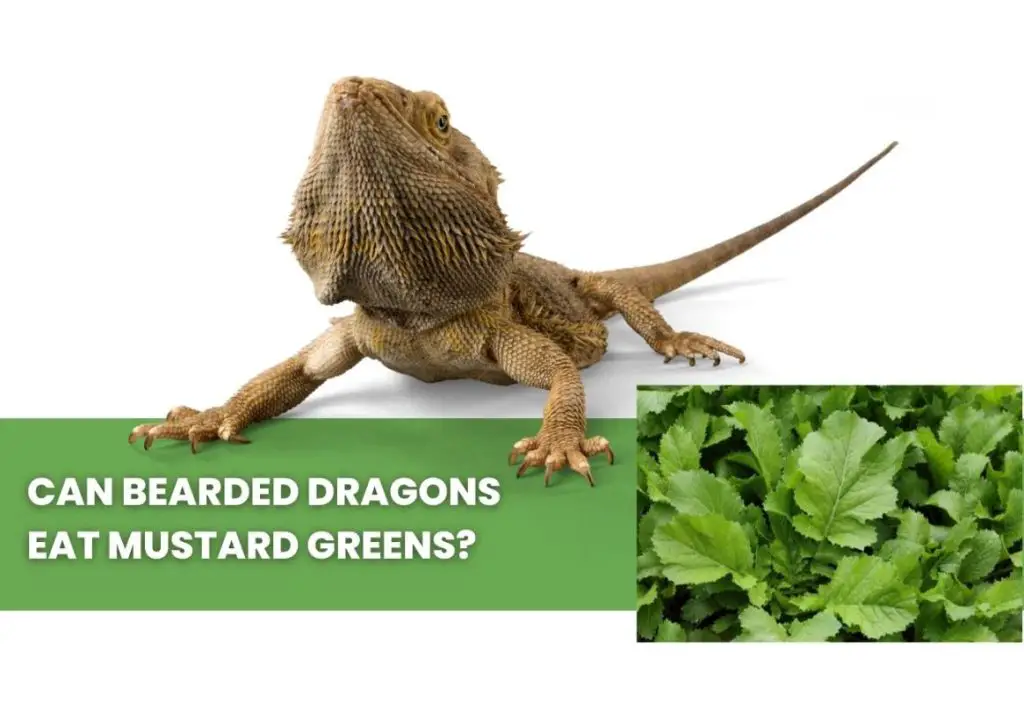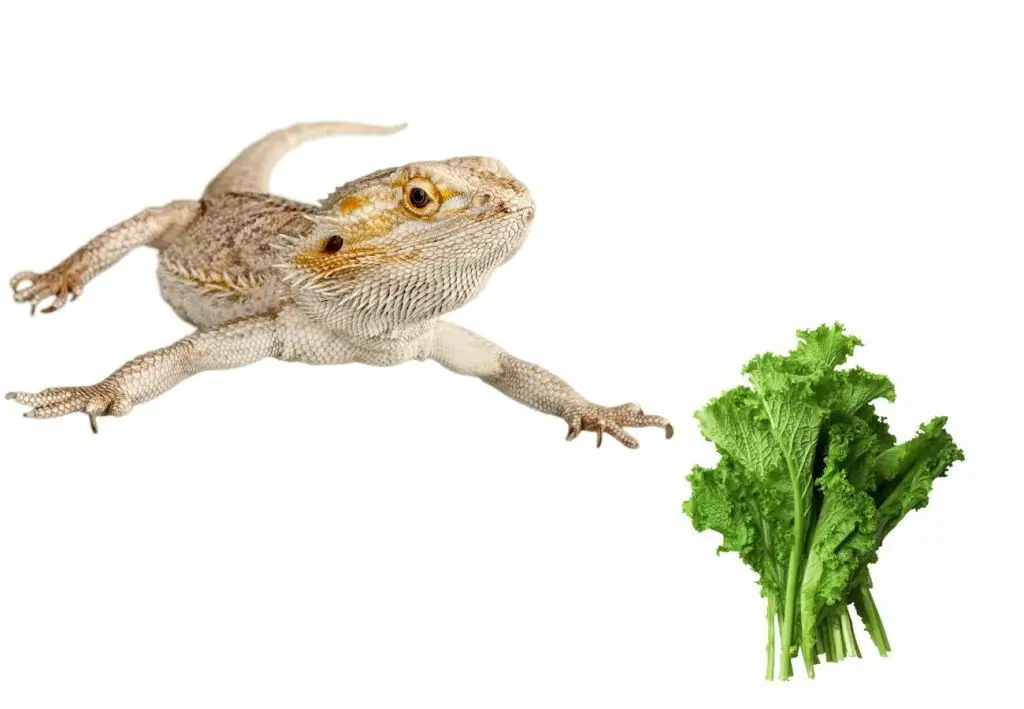
Bearded Dragons And Mustard Greens – Yea Or Nay
Mustard is made from mustard plant seeds, which grow bushy green leaves. These leaves are called mustard greens.
But, can bearded dragons eat mustard greens? Yes, absolutely.
This article will highlight the nutritional value and other information about mustard greens in your bearded dragon’s diet.
Nutritional Information Of Mustard Greens
Mustard greens are an excellent source of essential nutrients and an excellent choice to add to your pet dragon’s meal.
The Nutritional Information Of Mustard Greens
| Nutrient Name | Amount |
| Water | 90.7 g |
| Energy | 27 Kcal |
| Protein | 2.86 g |
| Total lipid (fat) | 0.42 g |
| Carbohydrate, by difference | 4.67 g |
| Fiber | 3.2 g |
| Sugars | 1.32 g |
| Calcium | 115 mg |
| Iron | 1.64 mg |
| Phosphorus | 58 mg |
| Sodium | 20 mg |
| Vitamin C | 70 mg |
| Vitamin D (D2+3) | 0 ug |
| Vitamin B6 | 0.18 mg |
| Vitamin A RAE | 151 ug |
| Vitamin A IU | 3024 ug |
| Beta Carotene | 1790 ug |
| Vitamin E | 0 mg |
| Vitamin K | 257.5 ug |
Mustard greens are known for their essential compounds and high levels of micronutrients. These leafy greens are rich in vitamin A, vitamin C, and vitamin K.
Mustard greens are high in beta carotene and calcium and have low levels of oxalates and phosphorus.
For more information about the benefits and risks of mustard greens in your bearded dragon’s diet, read on.
Benefits Of Mustard Greens To Your Beardies Health

Vitamin A and Beta Carotene
Mustard greens have moderate amounts of beta carotene and vitamin A. which are great for your bearded dragon’s diet.
Beta carotene is a type of carotenoid precursor for vitamin A. Beta carotene converts into vitamin A in your bearded dragon’s body.
Beta carotene and vitamin A support a healthy immune system, eye health, and overall organ health.
You should be aware that too much vitamin A might lead to vitamin A toxicity. This condition is of concern when you feed your bearded dragon mustard greens.
The best way to avoid vitamin A toxicity is to not add any supplement for this vitamin to your beardie’s diet.
Vitamin C
Mustard greens contain a large amount of vitamin C, which helps support skin and bone health. It is yet another reason why you should include them in your bearded dragon’s salad bowl.
Vitamin K
Even though Vitamin K is not always a topic of discussion, it is a vital nutrient for bearded dragons. Vitamin K is a fat-soluble vitamin that supports bone health and aids the body in healing wounds.
Since this vitamin contributes to healthy bones, it complements calcium, and vitamin C.
Reptiles carry bacteria on their skins, and wounds should stay clean and heal fast.
Mustard greens are a great way to ensure that your pet lizard will naturally and quickly heal its external wounds.
High Calcium Levels
Mustard greens are calcium-rich and among the top greens available to increase your beardies’ calcium intake.
Calcium plays a vital role in your bearded dragon’s diet. Without calcium, your beardie will get sick and probably suffer from metabolic bone disease.
There are two ways in which you can ensure your bearded dragon gets all the calcium it needs in its diet.
- Feeding calcium-rich greens and vegetables
- Offer a calcium supplement
Offering your bearded dragon’s greens and veggies daily that are abundant in calcium is essential to providing them with all the calcium they need to stay healthy.
Good Calcium To Phosphorus Ratio
Mustard greens have good calcium to phosphorus ratio.
The phosphorus level in food is just as significant as food’s calcium level. Phosphorus can bind with calcium and prevent calcium absorption into the bloodstream. This means the more phosphorus your bearded dragon consumes, the less calcium its body will absorb.
The recommended calcium to phosphorus ratio for bearded dragons is 2:1 or 1:1.
Mustard greens are around the 2:1 ratio, which is another good reason to add them to your bearded dragon’s diet.
Risks Of Feeding Mustard Greens To Bearded Dragons
There are no variable levels of nutrients in mustard greens to make you worry. We would like for you to take notice of the following.
Oxalates
Mustard greens contain a moderate level of oxalates or oxalic acid. Oxalates are generally found in vegetables, plants, and leafy greens.
Oxalic acid binds with calcium and other trace minerals which stops the calcium from being absorbed and used in your beardie’s body.
Can A Baby Dragon Eat Mustard Greens?
You should not give baby dragons, less than a few months old, too many mustard greens. It might cause problems like constipation and diarrhea.
Remember, baby bearded dragons’ diets must consist of 80% insects and 20% plant-based foods. Only feed your baby beardie a few veggies and vitamins for now. Once it grows older, you can start feeding it more mustard seeds and other popular greens.
How Often Can Bearded Dragons Eat Mustard Greens?
The amount of mustard greens you can feed your beardie depends on its age, weight, and overall health.
Beardie babies less than a year old should be given mustard greens in moderation. Please see the following diet table indication on the amount allowed per age.
| Age | Amount |
| 3 – 4 Months Old | Small Bowl |
| 5 – 7 Months Old | Medium Bowl |
| 8 – 12 Months Older | Large Bowl |
| Older Dragons | As Much As You Want |
When your dragon is older than a year, you can feed it as many vegetables and fruits as you like, and just make sure of the nutrient value of the foods you provide your beardie.
Preparing Mustard Greens For Your Bearded Dragon
Before mustard greens go directly into your bearded dragon’s salad bowl, there are a few preparation steps to follow.
Go Organic
We always recommend that you go organic when possible. Organic food is free of fertilizer, pesticides, and other chemicals.
Wash
You should wash the greens thoroughly under clean running water.
Chop It Up
Although bearded dragons love to tear leafy greens, mustard green leaves can be quite large and difficult to manage. We recommend that you chop the greens up into manageable pieces.
Serve
You can now add the mustard greens in a veggie and greens mix to maximize the number of nutrients your bearded dragon ingests. Serve the salad to your bearded dragon.
Wrapping Up
There are many benefits of feeding mustard greens to your bearded dragon. These leaves qualify as acceptable daily greens for your beardie’s salad.
We suggest you try other greens and vegetables such as bok choy, dandelion greens, and collard greens.
Continually research new food you want to add to your bearded dragon’s diet. Even the healthiest foods can have risks. Should you remain unsure, you can always contact your vet for advice.
Continue to read our main article “What do Bearded Dragons Eat?” for all the ins and outs on general diet questions, and get a further detailed breakdown of other popular foods in the articles below:
- Can Bearded Dragons eat tomatoes?
- Can Bearded Dragons eat oranges?
- Can Bearded Dragons eat parsley?
- Can Bearded Dragons eat blackberries?
- Can Bearded Dragons eat pumpkin?
- Can Bearded Dragons eat pineapple?
- Can Bearded Dragons eat cantaloupe?
- Can Bearded Dragons eat green beans?
- Can Bearded Dragons eat cherries?
- Can Bearded Dragons eat asparagus?
- Can Bearded Dragons eat mango?
- Can Bearded Dragons eat cauliflower?
- Can Bearded Dragons eat avocado?
- Can Bearded Dragons eat brussel-sprouts?
- Can Bearded Dragons eat collard-greens?
- Can Bearded Dragons eat wax-worms?
- Can Bearded Dragons eat dandelions?
- Can Bearded Dragons eat nightcrawlers?
- Can Bearded Dragons eat earthworms?
- Can Bearded Dragons eat eggs?
- Can Bearded Dragons eat basil?
- Can Bearded Dragons eat peaches?
- Can Bearded Dragons eat grasshoppers?
- Can Bearded Dragons eat sweet potato?
- Can Bearded Dragons eat hornworms?
- Can Bearded Dragons eat Mice?
- Can Bearded Dragons eat Cucumbers?
- Can Bearded Dragons eat Cabbage?
- Can Bearded Dragons eat Kale?
- Can Bearded Dragons eat Bell Peppers?
- Can Bearded Dragons eat Broccoli?
- Can Bearded Dragons eat Meat?
- Can Bearded Dragons Eat Green Onions?
- Can Bearded Dragons Eat Ants?
- Can Bearded Dragons Eat Mint?
